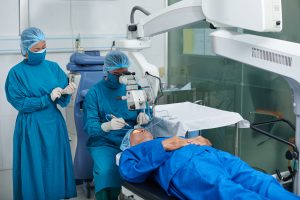 Cataract surgery is a common procedure for treating cataracts. Recovery from cataract surgery is pretty smooth and uneventful, as long as you are healthy. Statistics reveal a high success rate of healthy vision post-surgery.
Cataract surgery is a common procedure for treating cataracts. Recovery from cataract surgery is pretty smooth and uneventful, as long as you are healthy. Statistics reveal a high success rate of healthy vision post-surgery.
Normal timeframe for uncomplicated cataract surgery is around 10 minutes, but you will have to remain in a recovery area after surgery as you will be under sedation and feeling groggy. The post-surgery recovery time can range from 30 minutes to an hour before you can go home.
Advertisement
You will need someone to take you home as you will be unable to drive. Also, you will be given a pair of sunglasses to protect your eyes from glare and sunlight.
You may feel tired upon getting home, so rest is advised. Your surgeon will advise you when it is safe to remove the protective covering on the eye. Keep in mind, though, that you will need to put this covering back during naps or when you sleep at night to protect your eye during the next few days after the surgery.
Tips for a cataract surgery recovery at home
Symptoms you may encounter after surgery once you are at home include mild pain in or around the eye, itchy or sticky eye, blurred vision, feeling of grittiness in the eye, slight headache, bruising of the skin around the eye, and discomfort when looking at bright lights. These are normal symptoms that will clear up within a few days’ time.
Symptoms that should prompt you to see a doctor include throbbing or severe pain in or around the eye, severe frontal headache with or without nausea or vomiting, sudden deterioration of vision, increased redness of the eye, or the sudden appearance of black spots, specks, or streaks in your line of vision.
After surgery, you should avoid strenuous activities such as lifting heavy objects, avoid bending forward or having your head below your waistline, avoid touching or rubbing your eye, avoid getting shampoo or soap in the eye, avoid wearing eye makeup, avoid swimming, and avoid any sports or activities where there is a risk of eye injury.
You will be able to watch TV or read almost immediately. Although driving should be avoided after surgery, you may go back to driving once you have your doctor’s approval.
Many patients will be required to wear glasses either for distance or closeness because artificial lens implants cannot focus on different distances. Natural lenses are able to do this if the patient is under 50, but this ability is lost with age.
Advertisement
You will also be required to attend follow-up appointments in order to monitor the health of your eyes and ensure the healing is going well. During these appointments, your doctor will also instruct you when you can resume your everyday activities and whether you need to use eye drops.
For the most part, cataract surgery is safe and uncomplicated, so you shouldn’t experience too many problems during the recovery period.
Also read: Prevent cataracts naturally: Home remedies and diet
